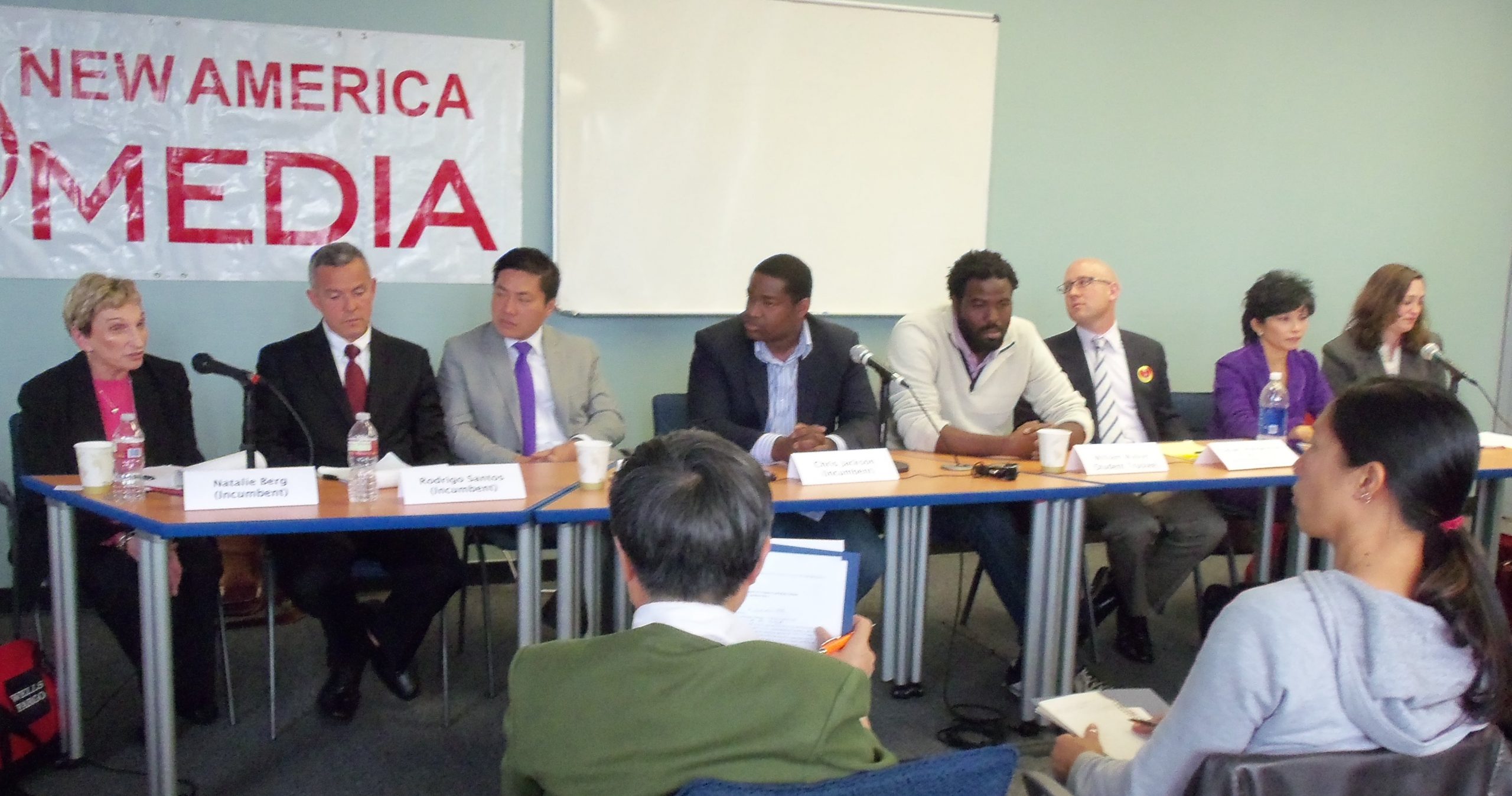* Also: See the KALW Radio’s Jen Chien on the crisis at City College.
* See below: VIDEO: New America Media reports on candidates’ debate.
Free “lifelong learning” classes for the community could be the first cuts as City College of San Francisco struggles to downsize and retain its accreditation, say several candidates for the college’s Board of Trustees.
Other California community colleges are under pressure to get rid of lifelong learning courses, too. But candidates at a debate leading up to the Nov. 6 election to fill four available seats on the seven-member panel all said they would not cut key classes, such as English as a second language and computer courses.
Current board members say the plan is not to eliminate all lifelong learning classes, but they advocate cutting nonessential, noncredit courses, including photography and pottery.
For San Francisco, Decision Time on City College (Video courtesy New America Media)
Natalie Berg, a trustee who is seeking a final term, said at the candidate forum Friday that the board planned instead to increase classroom sizes and charge students as if they were regular credit courses.
“I’d be open to charging for lifelong learning classes,” said another current board member, Steve Ngo, who is running for re-election. “But I also voted to change the mission statement in which to eliminate these courses, because people want basic skill classes more than lifelong learning.”
Another board member running for re-election, Rodrigo Santos, said that although lifelong learning classes are important, the school needs to become financially self-sufficient. The noncredit courses that remain, he said, should receive sufficient funding.
The stakes are high in this election because City College on Monday and submitted a draft progress report to the Accrediting Commission for Community and Junior Colleges to show its progress on addressing the issues. The college will have until March 15, 2013, to make its case for why it should be able to keep accreditation and how it plans to close down the college if it does not receive accreditation.
The school was criticized for spending 92 percent of its budget for salaries and benefits, one of the main factors in its financial woes.
The candidates said the list of challenges in the next five months was long: cutting courses current students take for credit, improving budgeting, restructuring the school’s governance and finding new sources of revenue.
The candidates squared off in a debate hosted by New America Media, a nonprofit organization that networks the ethnic press, which drew eight of the 10 candidates appearing on the ballot: Natalie Berg, Rafael Mandelman, Rodrigo Santos, Will Walker, Chris Jackson, Amy Bacharach, Steve Ngo and Hanna Leung. Not attending were Nate Cruz and George Zazhappally.
Out-of-control spending
Berg said City College has always been a generous institution and has done much for the community. Unfortunately, its spending has gotten “out of hand.”
Other California community colleges are suffering from budget cuts, but as the largest community college in the state in terms of students and staff, with more than 80,000 students, the scale of its problems are greater.
The accreditation agency has specified that the school has to live within its fiscal reality. For example, City College offered part-time workers the same health care benefits as full-time faculty, which it cannot afford to do, said first-time candidate Bacharach.
“I am for Prop. A, but I also think we shouldn’t rely on funding that may not materialize later,” Bacharach said. “I haven not heard of other schools giving health care benefits to part-time faculty.”
When City College started having fiscal problems one of the first solutions it made was to cut services for the Southeast, Evans and Mission campuses, said Jackson, another current member running for re-election.
“I said this was wrong because communities of color need more access and I’m not going to let them fall down during this economic recession,” Jackson also said. “There were horrific decisions made in terms of fiscal responsibility and these were made 10 years ago before I got on the board.”
First-time candidate Mandelman said the board has to obtain more revenue for the school. He wants to work through Nov. 6 to get city Proposition A passed to increase the college’s funding and look for additional ways to help the school get back on track.
“For example,” Leung, another first-time candidate said, “we have one of the best football teams in this state and we should be able to market them and gain sponsorship.”
School governance
Steve Ngo said there were philosophical differences among board memebers about whether the current system of power, shared governance, was working.
Bacharach said the accreditation agency made 14 recommendations and most of them dealt with governance. Bacharach also said the structure of shared governance was not working.
“Some of us thought we should refer back to administration and faculty for everything and others questioned whether or not we should do that,” Ngo said. “We can’t refer back to the faculty constantly on important fiscal and policy issues. It’s been going on for 20 years.”
He also said the board has been reeling since 2009, when some top administrators faced criminal charges. The San Francisco Chronicle reported that last year Philip Day, former chancellor of the school, pleaded guilty to felony charges of misusing public funds. He had diverted nearly $100,000 in college funds to a campaign for community college bond ballot measures.
Another issue the board faced was a damning audit that accused the school of wasting taxpayers’ money.
“I think the problem is the lack of leadership,” Leung said. “It seems to me there’s a communication style issue. We would dwell on one issue for several hours instead of going straight to a resolution.”
The candidates
Mandelman, a public-law attorney, has worked with Bay Area cities on important issues such as affordable housing, municipal budgeting, land use, environmental protection and development, for over a decade. While working with the Building Inspection Commission and Board of Appeals, Mandelman said, he worked to ensure laws were applied fairly and neighborhood concerns received attention.
“I want to serve San Francisco and I don’t think there’s any institution that’s more important in this city than City College,” Mandelman said. “I believe I have the skills and passion for saving this institution that’s so critical to San Francisco.”
Santos, a structural engineer, turned Santos & Urrutia, a small engineering partnership in 1998, into one of most successful such firms in the Bay Area. As trustee, he said he wanted to restore lost financial resources, bring in cutting-edge technology, expand class choices and hire more educators.
Bacharach, who has worked for several boards and task forces, such as the San Francisco Women’s Political Committee, said her experiences at City College sparked her passion for education policy and civic involvement. Her aim is to ensure the accessibility of classes City College.
“I worked with the board, the president and the students, so I bring in a unique combination of perspectives.” Bacharach said.
Ngo, chair of the civil rights committee of the Asian American Bar Association in the Bay Area, was elected to the City College Board in November 2008.
One of his main goals is to improve college completion opportunities for all students, confronting the structural barriers that make it harder for students to reach their educational goals.
Leung, an attorney, works with injured workers. Most of her clients depend on training from City College to return to work. She said she wants to bring better leadership to the board and improve programs for immigrants.
“What I would bring in to City College are my qualifications in generating revenues and bringing balance to the board,” she said.
Jackson, who worked as a research and policy analyst for the San Francisco Labor Council from 2007-2010, said his goal is to insure that all communities have access to education.
Jackson is a founding board member of Young Workers United, a labor advocacy group that has pushed for expanded worker rights for young people, immigrants, and those in the service industry sector.
Current student Trustee Walker is seeking a seat on the board. His said one of this main objectives is to ensure that students are heard on the board. During the debate he also questioned the racial diversity of the City College teaching staff.
Nate Cruz, who did not attend the debate, works as a finance manager for the Port of San Francisco.
George Vazhappally, who also did not attend the debate, is listed as a small businessman on the ballot.









